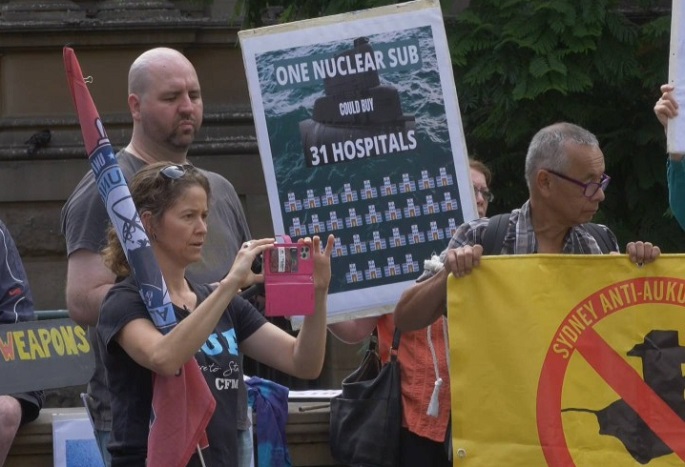AUKUS nuke submarine deal sparks protest in Sydney
Published : 16 Mar 2023, 01:34
A group of protestors gathered outside the Sydney Town Hall on Tuesday to demonstrate against a newly-announced nuclear submarine agreement between Australia and its AUKUS partners, the United States and Britain, reported Xinhua.
Members from the local activist group Sydney Anti-AUKUS Coalition unfurled a banner that read, "No Nuclear Subs."
Another banner read, "AUKUS Steals From Us," and informed onlookers that the hundreds of billions of Australian dollars splashed on the eight nuclear submarines could have been used to create 320,000 homes, 4,500 schools, and 270,000 jobs for local people.
With crowds of people passing by during the afternoon peak hour, the Town Hall also saw dozens of protestors waving placards that said, "Peace for the Pacific," "One Nuclear Sub Could Buy 31 Hospitals" and "No Nukes Never Again."
On Tuesday morning, Australian Prime Minister Anthony Albanese, U.S. President Joe Biden and British Prime Minister Rishi Sunak jointly announced Australia's acquisition of nuclear submarines.
Local newspaper The Australian estimated that the deal will cost 268 billion to 368 billion Australian dollars (about 178 billion to 245 billion U.S. dollars) by mid-2050. Eight AUKUS-class submarines will be built in Adelaide, the capital of South Australia, with the first to be completed by 2042.
In the interim, Australia will acquire three U.S.-made Virginia-class subs as soon as the early 2030s. British and U.S. submarines will begin regular port visits and a rotational presence in Australia.
In a bilateral meeting with Biden, Albanese called the deal "a very good thing," adding, "I have no doubt that this agreement will be very welcomed in Australia."
Protestors in Sydney, however, voiced disagreement over the prime minister's words.
"We don't welcome it. And I think as it dawns on people what it means, I think it's going to become more and more unpopular," said Dennis Doherty, who helped organize the campaign.
Doherty told Xinhua that the announcement of the AUKUS deal had saddened him. "It was a very bad day for Australia and for Australian young people. It means that for the next 20 to 40 years, Australia will be facing a massive expenditure," he said.
"Instead of dealing with the problems that are in our own country and in the region, there will be wasting money on these dreadful weapons of mass destruction. That is completely unnecessary," he added.
Meanwhile, the deal also sparked criticism among politicians, scholars and local media in the country.
Former Australian Prime Minister Paul Keating slammed the AUKUS pact as "the worst international decision by an Australian Labor government since the former Labor leader, Billy Hughes, sought to introduce conscription to augment Australian forces in World War I."
In a commentary released on Wednesday, Keating elaborated on his opinion that the current government is falling into a major mistake "with an American sword to rattle at the neighborhood to impress upon it the United States's esteemed view of its untrammeled destiny."
Matt Fitzpatrick, professor at Flinders University, argued that with AUKUS, Australia has wedded itself to a risky U.S. policy on China -- and turned a deaf ear to the region.
"It leads Australia towards half a century of armaments build-up and restricted sovereignty within a U.S.-led alliance aimed at containing China," Fitzpatrick said in an article published by the media network The Conversation.
The scholar believed there is a danger of handing over Australia's sovereign foreign policy decision-making to the United States and relaxing into the faux security offered by AUKUS.
"Australia could have tried to work towards a regional approach with other Asian and Pacific countries. But this week's agreement makes that all but impossible," the scholar noted.
A report from the Australian Financial Review also raised the alarm about high-level nuclear waste that would burden Australia under the AUKUS deal.
Australian Conservation Foundation Analyst Dave Sweeney was quoted as saying that a dump could become a Trojan horse for other high-level waste, as nuclear submarines are powered by highly enriched uranium which inevitably becomes high-level radioactive waste.
"AUKUS presents by far the biggest threat yet that Australia will become a dumping ground for the world's worst nuclear waste," Sweeney warned.


